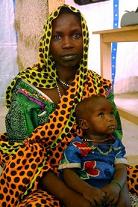Major powers discuss how to prod Sudan to accept UN-AU force
March 7, 2007 (UNITED NATIONS) — The world’s major powers have started examining what to do to encourage Sudan’s president to accept a joint U.N.-African Union force to help bring peace to conflict-wracked Darfur – and what action to take if he refuses.
 The five permanent Security Council members – the U.S., Russia, China, the U.K. and France – discussed the Darfur problem Tuesday amid growing frustration at the absence of a positive response from Sudanese President Omar al-Bashir not only on the “hybrid” force but on a U.N. plan to increase the 7,000 A.U. troops currently on the ground.
The five permanent Security Council members – the U.S., Russia, China, the U.K. and France – discussed the Darfur problem Tuesday amid growing frustration at the absence of a positive response from Sudanese President Omar al-Bashir not only on the “hybrid” force but on a U.N. plan to increase the 7,000 A.U. troops currently on the ground.
Britain’s U.N. Ambassador Emyr Jones Parry said Wednesday the permanent members “were looking seriously at what we could do to encourage a positive answer to come out of Khartoum and to look forward at what would we do if we didn’t get that answer.”
Sudan agreed in November to a three-stage U.N. plan that would strengthen the A.U. operation and culminate in a 22,000-strong joint U.N.-African Union peacekeeping mission. But in January, al-Bashir said U.N. troops were not required in Darfur because the A.U. force on the ground could maintain order.
The first stage of the U.N. plan – a “light support” package adding some equipment, military officers and U.N. police to the A.U. operation – is nearly complete. But the second phase – deploying more than 3,000 U.N. military, police and civilian personnel, along with substantial aviation and logistical assets – has been held up because a long-promised letter from al-Bashir confirming his acceptance has yet to arrive.
Last month, the U.K.’s minister for Africa accused al-Bashir of seeking a military solution in Darfur and warned that he will likely face new sanctions unless he keeps agreements to promote peace.
Foreign Office minister Lord David Triesman said al-Bashir faces a critical test in early spring which will demonstrate whether he is committed to ending the four-year conflict that has killed more than 200,000 people and forced 2.5 million to flee their homes.
He said the agreement was that the phase-two “heavy support” package would arrive in Darfur in late March.
Al-Bashir will “either stick to that agreement or he’ll break it, and that’s a very fundamental test,” Triesman said. “Breaking it is a very, very clear message and has clear consequences.”
While the U.S., the U.K. and France support tough measures against Sudan if it doesn’t agree to an A.U.-U.N. force, Russia and China, both major commercial partners of Sudan, have so far resisted putting strong pressure on Khartoum to change its stance.
China’s deputy U.N. ambassador Liu Zhenmin said Wednesday that ambassadors from the five permanent council nations discussed some ideas on getting al-Bashir to accept the hybrid force but reached no agreement.
“They’re still assessing what kind of mission would be more appropriate,” he said. “That’s one idea.”
Liu said the U.N. and all the key “stakeholders” – including China, the E.U. and the U.S. – “need to speed up the efforts to convince the Sudanese government to cooperate with the U.N.”
He noted that China contributed to formulating the three-stage U.N. plan.
“That three-stage hybrid operation should be implemented as soon as possible,” Liu said.
Ghana’s U.N. Ambassador Nana Effah-Apenteng, a council member whose country holds the A.U. presidency, said council members “should redouble our efforts to bring the situation under control because the humanitarian situation is aggravating and everybody’s worried.”
He called on those countries with close ties to Khartoum to exert pressure so “at least we get concrete response from Sudan.”
(AP)
